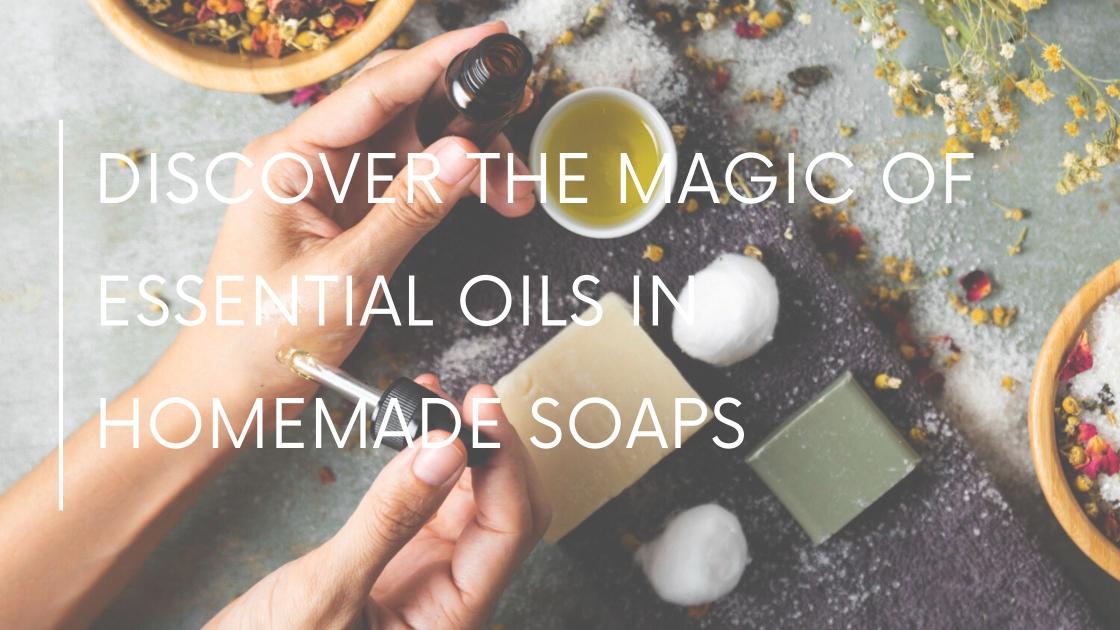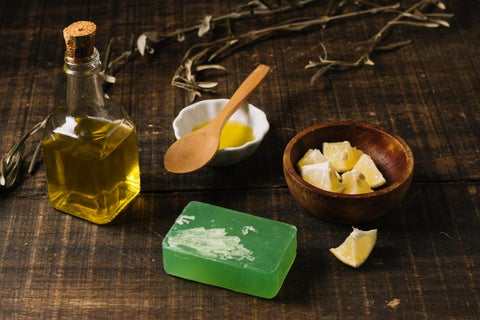Discover the Magic of Essential Oils in Homemade Soaps
The craft of soap making has transcended through the ages to evolve from a basic cleanliness need to a luxurious skin care regimen. Essential oils, due to their fragrant and therapeutic properties, take the limelight from the treasure chest of ingredients available for homemade soaps. This blog welcomes readers to the alluring world of essential oils and their many benefits in homemade soaps.
The Basics of Homemade Soap Making
What is Saponification?
Soap making is an ancient craft, almost as old as civilisation itself, founded on the chemistry of saponification. This includes reacting fat or oil and an alkali, as well as giving soap and glycerol. Homemade soaps, on the other hand, include this humectant, unlike commercial soaps, which mostly omit glycerin for separate sale and whose main aim is to increase skin moisture in the first place.
Homemade vs. Commercial Soaps
There has been much debate over homemade and commercial soaps, but the advantages of going homemade are indeed clear. Making your soaps can give you control over everything that goes into the making, ensuring no harsh chemicals and preservatives are involved. This change is not only healthy for your skin but is also very environmentally friendly to some extent because homemade soaps usually incorporate very ecologically friendly materials and methods.
Choosing Your Base
The carrier base oils form the basis of any quality soap. Coconut, olive, and palm oils are popular for their lathering and moisturising properties. In making your own soap, use some quality oils that will enhance the skin and provide a base for the essential oils to add in.
Understanding Essential Oils
Essential oils are plant extracts. They contain highly concentrated essence, aroma, and the healing properties of the source plant. They can be extracted using distillation or mechanical methods, such as cold pressing. The essential oils at The Soapery are pure and undiluted; they are the soul of your handmade soap, directly connecting you with nature's enormous aromatic and therapeutic resources. Opt for these high-grade oils to ensure your soap provides the maximum benefits.
Benefits of Using Essential Oils in Homemade Soaps
Natural Fragrance and Aromatherapy Benefits
Essential oils have a natural scent—unlike synthetic fragrances, which commonly contain some chemicals associated with health issues. This also gives aromatherapy, bringing relaxation, improving mood, and minimising stress to your bath or shower routine.
Skin Health Enhancement
Many essential oils have properties that heal the skin. For example, the best point of tea tree oil is known to be antibacterial and antifungal, while the qualities of lavender oil calm sensitive skin. These, if used in your homemade soaps, can boost skin health and, on the other hand, help treat skin problems.
Environmental Friendliness
Using natural essential oils for soap making is eco-friendly compared to synthetic fragrances and additives. Essential oils are plant-derived and environmentally safe, making them ideal for use in handmade soap.
Therapeutic Properties
Essential oils used in soap can offer and be medicine with various therapeutic properties, including anti-inflammatory, antiseptic, and analgesic effects. Now, your homemade soap will be not only cleansing but even medicinal, freeing you from different ailments and bringing your general well-being.
Personalisation and Creativity
The idea of essential oils in homemade soaps presents room for personal touch. You can personalise to the extent of blending for your type of skin, scent, and health needs. This also makes the soap-making process even more personalised and creative.
Incorporating Essential Oils into Soap Recipes
Choosing the Right Oils
Choosing the essential oils of your soap should be based on the result or feeling you want to produce. Would you like soap that gives refreshment, relaxation, or healing? Eucalyptus and peppermint are invigorating and ideal for use during morning showers, while chamomile and ylang-ylang are calming and perfect for use during relaxation.
Blending for Harmony
First, you could create a signature smell by blending these essential oils. Add base notes (like sandalwood), then middle notes (like lavender), and at the end, high notes (like citrus). These combinations will be experimented with and finally worked into something original, lending interest to the soap-making project.
Recipes for Every Skin Type
Soothing and moisturising, while the duo of lavender and chamomile will serve the dry skin with perfection. Astringent to the oily type, lemon and tea tree oil will make a great couple. Customise your soap recipes to meet specific skin needs, enhancing your skin's natural beauty and health.
Safety First
The huge variety of uses of essential oils has raised some caution. Essential oils must always be correctly diluted to avoid irritation; some people may be allergic to them. If applied, it is always good to seek professional advice, especially for pregnant women and those with other health conditions.
Creative Ways to Package and Present Your Essential Oil Soaps
Eco-friendly Packaging
Align the ethos of nature at par with naturally crafted, homemade soaps and look for eco-friendly packaging—maybe biodegradable wrapping paper, recyclable boxes, or fabric wraps to add a personal touch yet remain green in some way. This will be according to the sustainable nature of your soaps and will appeal, at the same time, to the consumers who concern themselves with the environment.
Gifting Homemade Soaps
Thoughtful gift ideas for a birthday or special occasion include homemade essential oil soaps. Take it a step further and customise your own labels, showing what blend of oils you used and what each is good for. Think of soaps in combination with other homemade skin care products, such as scrubs or lotions.
Labelling for Safety and Transparency
Properly label the list of all ingredients, including essential oils, singling out present allergens and giving instructions for usage. This should be clear enough to establish confidence in your recipients to use and benefit from your homemade essential oil soaps.
Wrap Up
Making your own soaps at home allows you to produce an expression that is a mix of creativity, sustainability, and wellness. A simple hygiene product turns into a treasure with an aroma that is therapeutic for your skin and soul, with the addition of essential oils. Embark on the fragrant journey, experiment with the most natural ingredients, and share the magic of your creations with the world. Your skin, mind, and the planet will be grateful.









0 comments